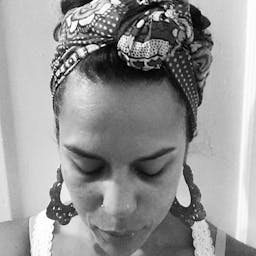Universal Spirit: Inter-Faith Roots Teach Tolerance
Jan 21, 2015
Story
My latest piece for newlatina.net.
I thought that it was fitting to share here.
In an age where the greatest segment of our nation’s resources are invested in wars that are seemingly driven- or at least shaped- by religious conflict, I have spent a great deal of time reflecting on God, human nature, and our universal capacity to understand or reject difference.
My own family’s religious diversity has taught me that what I believe to be a universal truth: God is One. As a child, I was exposed to religious and spiritual traditions from Pentecostalism and Islam to Catholicism, Espiritismo, and Judaism. My maternal grandmother was a fervent Pentecostal and former spirit medium, whom even in her stringent adaptation of Jesus’ teachings continued to serve as a vessel for the Holy Spirit. On my father’s side, my family members were Sunday Catholics who observed all of the religious holidays and ensured that we children received our Sacraments.
I had in fact been baptized as a toddler, and later did my Communion. I felt special that I could join the members of the church in accepting the chalky disc of flour which we symbolically celebrated as the Body of Christ. At such a young age, receiving Communion and entering the mysterious confessional booth were a personal indulgence for me. The elaborate rituals didn’t necessarily make me feel connected to God, but they did make me feel connected to community. I loved the lush ritual and commanding architecture of my church, and looked forward to the big Sunday breakfasts we enjoyed as a family once mass was over. I was moved by the collective pause to wish peace upon each other during mass. Today, when I want almost instant peace, I visit the Catholic Church to meditate and take in the rich smells and sights nestled within. I know that only a divine hand could inspire such beauty, and feel the vibration of all of the collective blessings that have filled the space at each mass.
On the other side of my religious heritage, I found the power of sacred music. While I dreaded my Pentecostal grandmother’s strict mandates that we avoid secular music and other “worldly” influences, I enjoyed the lively congregation at my uncle’s Pentecostal church when I visited Puerto Rico during schools breaks. I was deeply moved by the spirited musicality of the church where my cousins sang or played instruments for the band. I found the “shouts”, faith healing, and speaking in tongues fascinating despite my unabashed fear of these uninhibited displays of spiritual ecstasy.
I decided at a young age that the spontaneous manifestations of the Holy Spirit were too much for me to handle. However, I never dismissed the profound joy I felt each and every time I heard the jingly, jubilant rhythm of the tambourine. To this day, I stop every time I hear a Pentecostal, Baptist, or other animated Protestant service in session. The mostly humble, one room churches that dot Latino and African American communities across the United States radiate the spirit of struggle, joy and strength that has kept our communities alive for centuries. I know that the stirring sounds of those voices and instruments in tandem are a divine gift.
Celebrating Yoruba/Lukumi Tradition
To my some of my family’s chagrin, I am neither Catholic nor Pentecostal. My mother inherited my grandmother’s gift for communication with the spirit world. She loves the Pentecostal church but chose to become an initiate of the Yoruba/Lukumi religious tradition. She is a medium and a priestess- a decision which cost her, the disdain of her parents. As a child, this was the tradition of my home and the one which I guarded most from outside derision. Having had a wealth of lenses and languages with which to deepen my relationship with God, I know that this is my path, because like the Pentecostal and Catholic traditions of my grandmothers, it is where I find myself closest to peace and communion with others.
As a Yoruba priestess and espiritista, I have dedicated my life to serving others and using the traditions and wisdom of our ancestors to help restore balance to the world. This will be the legacy I leave for my son. Like the Pentecostal laying of hands or the Catholic practice of contemplation, the Lukumi tradition offers many rich points of reflection and calls to action for personal and collective transformation. I will raise my son to honor nature and the ancestors, and see the divine hand of God in everything around him. I will teach him to access his inner reserves of sacred wisdom and life force to transform himself and the world around him, for the better. I will teach him that balance is the key to a long, healthy, and prosperous life. And in the end, I know that he will choose his own path. And whatever, the path, I will not reject him because God is love, and love has many faces and speaks many tongues. Perhaps if the world we lived in were governed by this truth, we’d all find greater peace.
Learn more about Yoruba
Recommended Reading:
Yoruba/Lukumi Tradition:
The Altar of My Soul By Marta Moreno Vega, Ph.D
Espiritismo:
Collection of Selected Prayers: Devotion Manual A Spiritualist Prayer Guide By Candita Gual
Puerto Rican Pentecostalism:
Masked Africanisms: Puerto Rican Pentacostalism By Samuel Cruz




